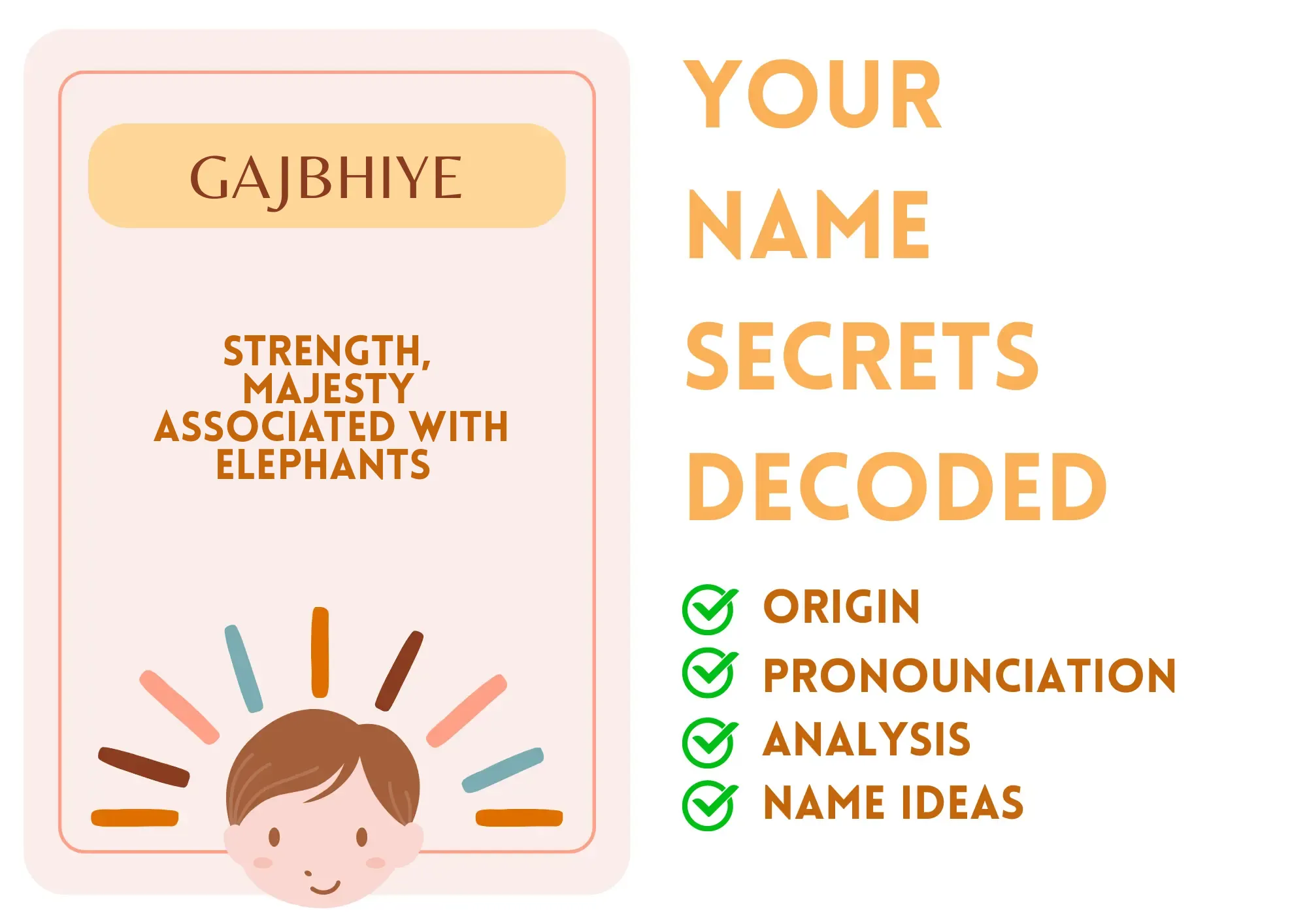
Gajbhiye
Gajbhiye is a unique name of Indian origin, traditionally used predominantly in Maharashtra. While its direct meaning is not widely documented, it is believed to connect with strength and majesty, with potential roots in the Sanskrit word 'Gaja,' meaning elephant, which symbolizes power and wisdom. The name is typically used as a surname, but its transition into a first name has been observed in recent years.
Gajbhiye carries cultural and familial significance, particularly among Marathi-speaking communities, often chosen to honor heritage and lineage. It reflects resilience, nobility, and a deep connection to cultural identity.
The perception of Gajbhiye is generally positive, associated with strength and rich cultural roots, making it a compelling choice for parents seeking a name with depth.
Basic Information
Gender: Boy
Sounds Like: GUJ-bhee-yeh
Pronunciation Explanation: The first syllable 'GUJ' rhymes with 'judge', 'bhee' as in 'be', and 'yeh' like the letter 'A' in 'yeah'.
Summary and Meaning
Meaning: Strength, majesty (associated with elephants)
Origin: Gajbhiye has its roots in Indian culture, specifically within the Marathi linguistic and cultural framework.
Usage: Gajbhiye is traditionally a masculine name, though it can be used for females in a modern context.
Name Number (Chaldean)
Name Number (Pythagorean)
Name Constellation (Nakshatra)
Name Zodiac Sign (Rashi)
Popularity (Global Rank)
Overall: 483000
Boys:
Most Popular in
Religious and Cultural Significance
Religion: Hindu
Background: In Hindu culture, the elephant symbolizes divinity, wisdom, and strength, making the name significant in its connections to cultural beliefs.
Cultural Significance: In Maharashtra, names like Gajbhiye often reflect pride in one's ancestry and cultural heritage. It carries a sense of belonging and respect towards traditional values.
Historical Significance: Historically, names associated with the elephant have been revered for representing nobility and are often mentioned in various cultural narratives and folklore throughout Indian history.
Popular Culture
Literature and Mythology: The name Gajbhiye is less commonly found in mainstream literature but is recognized in regional stories regarding valor and strength.
Movies and Television: While specific characters named Gajbhiye may be rare, the symbol of the elephant is often used in films and shows to depict virtues such as strength and wisdom.
Feelings and Perceptions
Perception: Gajbhiye is viewed positively, associated with qualities of strength, cultural pride, and uniqueness. It evokes feelings of respect among those familiar with the name.
Positive Feelings: Unique, strong, cultural, dignified, majestic.
Negative Feelings: It may be perceived as uncommon or difficult to pronounce for those not familiar with Marathi names.
Practical Considerations
Ease of Writing and Calling: Gajbhiye is moderately easy to write and pronounce for those familiar with Indian names. It has a rhythm that flows, though it may pose challenges for those unfamiliar with Marathi pronunciation.
Common Typos and Misspellings: Gajbhye,Gajbhiya,Gajbiye,Gajbhiyeh
Common Nicknames: Gaj,Bhiye,Gaji
Gajbhiye Popularity
Gajbhiye Usage and Popularity By Country
| Country | Rank (Overall) |
|---|---|
| India | 91763 |
Gajbhiye Usage and Popularity By City
| City | Rank (Overall) |
|---|---|
| Bombay | 33696 |
Compatibility Analysis
Famous Persons Named Gajbhiye
No results found for Gajbhiye.
Related Names
Similar Sounding Names:
Gajanan,Gajanand,Gajraj